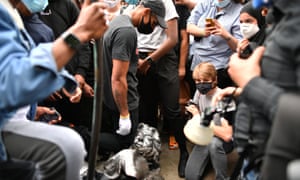Britain's reckoning with its racist past
UK Black Lives Matter protests have been taking place across the country. They have not just been about solidarity with the US or racism in Britain today, but also about the need to address Britain’s past and the impact of that legacy
The death of George Floyd in Minneapolis did not just prompt countrywide protests in America. Black Lives Matter protests have spread across the world. This weekend, 200 demonstrations took place in the UK, during which protesters toppled a statue of a 17th-century slave trader in Bristol and daubed graffiti on a statue of Winston Churchill in London. Protesters are now rallying for the removal of a Cecil Rhodes statue at Oxford University.
Guardian news reporter Aamna Modhin tells Anushka Asthana about covering the protests. She discusses why George Floyd’s death mobilised such a large show of solidarity in the UK. Kehinde Andrews, professor of black studies in the School of Social Sciences at Birmingham City University, looks at Britain’s racist history and whether these protests might finally change the way that it is viewed.
Archive: Good Morning Britain; Sky News; 10 Downing Street; Washington Post; Universal Apropos Media; YouTube

The Guardian is editorially independent. And we want to keep our journalism open and accessible to all. But we increasingly need our readers to fund our work.
Support The Guardian